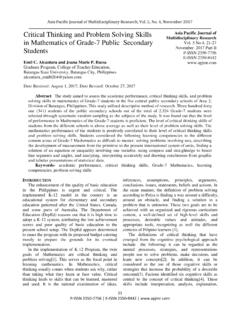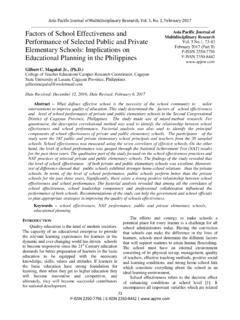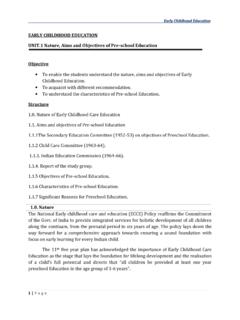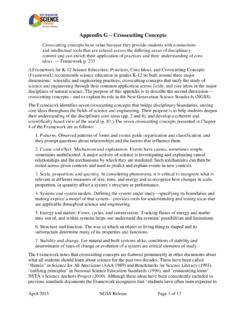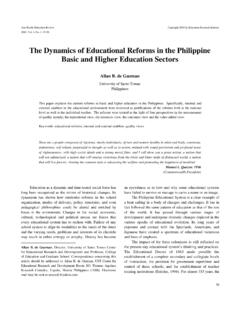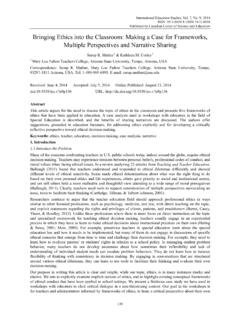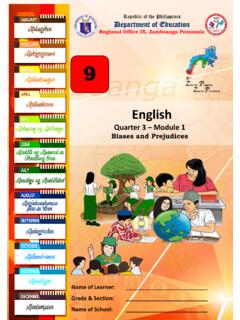Transcription of Educational Philosophies Adhered by Filipino Preservice ...
1 Asia Pacific Journal of Multidisciplinary Research, Vol. 5, No. 1, February 2017 _____ 185 P-ISSN 2350-7756 | E-ISSN 2350-8442 | Educational Philosophies Adhered by Filipino Preservice Teachers: Basis for Proposing Initiatives for 21st Century Teacher education Preparation Program Gilbert C. Magulod Jr. ( ) Faculty, College of Teacher education / Campus Research Coordinator Cagayan State University at Lasam, Cagayan Province, Philippines Date Received: December 7, 2016; Date Revised: January 29, 2017 Asia Pacific Journal of Multidisciplinary Research Vol. 5 , 185-192 February 2017 P-ISSN 2350-7756 E-ISSN 2350-8442 Abstract The study endeavoured to ascertain the Educational Philosophies Adhered by Filipino Preservice teachers.
2 Descriptive survey research method was employed. The participants of the study were the 76 fourth year Bachelor in Elementary education (BEED) and Bachelor in Secondary education (BSED) of the College of Teacher education in one state university in the Philippines. Data were gathered with the use of standardized research tool. Research findings showed that the Filipino Preservice teachers espoused a very high adherence to progressivism Educational philosophy and high orientation to existentialism and reconstructionism. They also showed a moderate adherence to perennialism and existentialism Philosophies .
3 These imply that they espoused a high student-centred teaching belief with partial acceptance to teacher-centred teaching belief. Test of difference and Post hoc analysis revealed that course, residence and scholastic standing in high school spelled differences on the Educational Philosophies of the Filipino Preservice teachers. Findings of the study present initiatives for 21st century teacher education preparation program. Keywords Educational Philosophies , Filipino Preservice teachers, Teacher education Preparation INTRODUCTION The increasing demand of best classroom practices, pedagogical approaches, and instructional strategies that define effective teaching in the 21st century challenge teacher education programs in preparing future teachers to equip them with the desired personal and professional teaching attributes and competencies.
4 Teaching excellence in the 21st century classroom belongs to those teachers who have the dispositions of being effective and passionate. Quality Preservice education is considered as a key factor in quality Philippine education . All efforts to improve the quality of education in the Philippines are dependent on the service of teachers who are properly prepared to undertake various important roles and functions of teachers [1]. It has been the role of teacher education institutions (TEIs) in the Philippines to ensure the preparation of quality Preservice teachers armed with the knowledge, skills and dispositions to become effective teachers.
5 These teachers in terms of the quality of learning are the ones who possess workable knowledge and excellent teaching practices accompanied with well developed Educational Philosophies . Teaching consists of beliefs, attitude, values and behaviors espoused by teacher to facilitate the students learning and development. These behaviors follow a pattern or model depending on the teacher s Educational philosophy. The Educational Philosophies are the framework to guide, filter, and consider the effort of teacher towards what she/ he believes as the purpose of education .
6 In relation, Educational philosophy is a point of view that provides a logical, rational, and valid basis for Educational effort and criteria for the selection of a sound Educational practice [2]. The personal beliefs, assumptions, and connections concerning the role of the teachers, the role of the learner, the goal of schooling , the ideal curriculum content, and the best means of including learning atmosphere constitute the Educational philosophy of a teacher [3]. Preservice teachers beliefs on the goal and purpose of education manifest their Educational philosophic orientation.
7 Their beliefs and conceptions Magulod Jr., Educational Philosophies Adhered by Filipino Preservice _____ 186 P-ISSN 2350-7756 | E-ISSN 2350-8442 | Asia Pacific Journal of Multidisciplinary Research, Vol. 5, No. 1, February 2017 about teaching will prepare them with their expertise to teach in the real world which will help them become effective facilitators of learning in the future. Rideout [4] affirmed that the basic determinant of individuals Educational dispositions is their Educational Philosophies . Such Educational dispositions are being formed founded on Educational philosophy.
8 Thus, a personal philosophical orientation is an important and active element of the teacher in the classroom. Developing and owning an Educational philosophy is influential in directing and guiding teachers in executing their teaching practices and most importantly on the way how they look at their learners whom they deliver their effort. Bilbao [5] affirmed that as teacher, one should have a philosophy of education because it is a strong belief that is translated into action that will guide them what to teach, how to teach, and why to teach. In the perspective of this study, the main five (5) Educational Philosophies were considered specifically essentialism, perennialism, progressivism, existentialism and behaviorism.
9 In brief descriptions, perennialism is an Educational philosophy adhering to the concept of conservative point of view mainly focused on the intellectual and moral standards. It emphasizes that schools must teach students with the ideas that are everlasting and the search for enduring truths are constant. Values are constant and unchanging through the literature, arts, Philosophies , and religions. For a classroom teacher adhering this Educational philosophy, subject-matter centered approach in teaching that requires mastery of learning content is emphasized.
10 Bago [6] noted that a perennialist educator is an authority figure in the classroom that transmit and interpret knowledge because they believe that education is the process of transmitting changing knowledge from generation to generation. Essentialism refers to the Educational philosophy which pertains to the traditional or back to basic movement as approach in teaching. As the name implies, it seeks to instill learners with the essentials of academic pursuit and knowledge. Educators espousing this philosophy believe that teaching students with the mastery of 3Rs will make them competent in the world.
